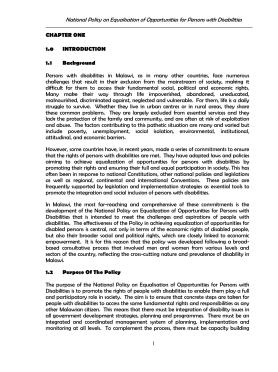National Policy on Equalisation of Opportunities for Persons with Disabilities
National Policy on Equalisation of Opportunities for Persons with Disabilities
Persons with disabilities in Malawi, as in many other countries, face numerous challenges that result in their exclusion from the mainstream of society, making it difficult for them to access their fundamental social, political and economic rights. Many make their way through life impoverished, abandoned, uneducated, malnourished, discriminated against, neglected and vulnerable. For them, life is a daily struggle to survive. Whether they live in urban centres or in rural areas, they share these common problems. They are largely excluded from essential services and they lack the protection of the family and community, and are often at risk of exploitation and abuse. The factors contributing to this pathetic situation are many and varied but include poverty, unemployment, social isolation, environmental, institutional, attitudinal, and economic barriers.
However, some countries have, in recent years, made a series of commitments to ensure that the rights of persons with disabilities are met. They have adopted laws and policies aiming to achieve equalization of opportunities for persons with disabilities by promoting their rights and ensuring their full and equal participation in society. This has often been in response to national Constitutions, other national policies and legislations as well as regional, continental and international Conventions. These policies are frequently supported by legislation and implementation strategies as essential tools to promote the integration and social inclusion of persons with disabilities.
In Malawi, the most far-reaching and comprehensive of these commitments is the development of the National Policy on Equalization of Opportunities for Persons with Disabilities that is intended to meet the challenges and aspirations of people with disabilities. The effectiveness of the Policy in achieving equalization of opportunities for disabled persons is central, not only in terms of the economic rights of disabled people, but also their broader social and political rights, which are closely linked to economic empowerment. It is for this reason that the policy was developed following a broad-based consultative process that involved men and women from various levels and sectors of the country, reflecting the cross-cutting nature and prevalence of disability in Malawi.

